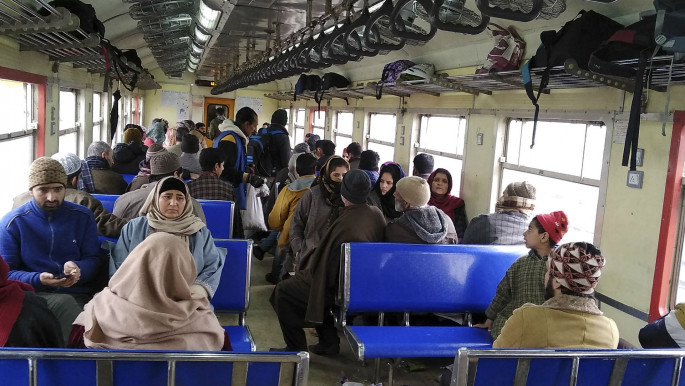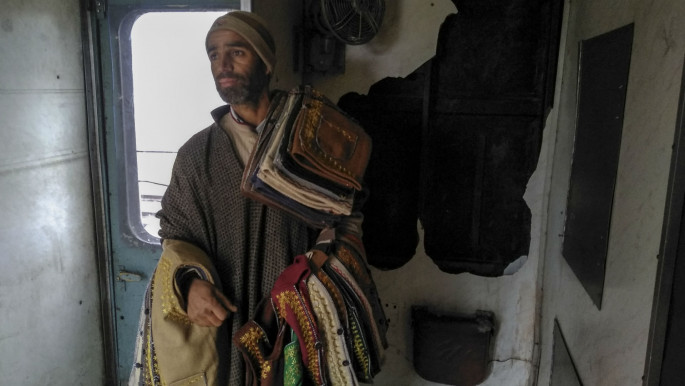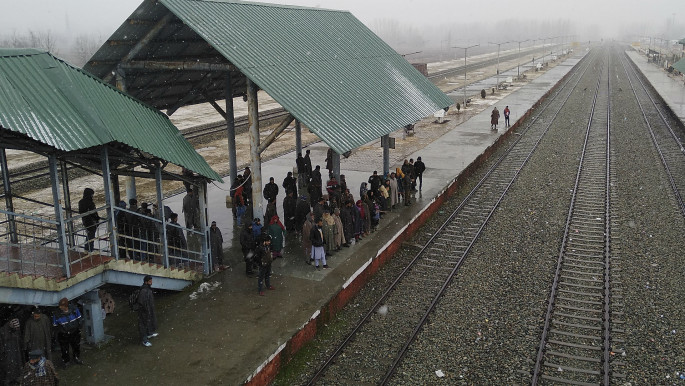Despite an insurgency, violence and airstrikes, Kashmir's train still serves the region's few tourists
The train was destined to Banihal, from where he would be leaving for Mumbai by road. It was Patil's second visit to the Kashmir Valley. He had visited several tourist places and concluded his visit by taking the train from Srinagar to Banihal. Since then Patil has recommended everyone to experience this train ride, when in Kashmir.
Patil is smitten by the beautiful landscapes of Kashmir's railway. During spring time, the train passes through lush green fields, amid mustard blossoms, while in the summer the lush green paddy fields present a mesmerising view. Nowadays, these fields are blanketed by snow, cheering the passengers with a fairy tale view.
A decade has passed since the train services were launched in Indian Kashmir, connecting Baramulla in north with Banihal in South. This 135 kilometres stretch links the two extreme edges of the Kashmir Valley, allowing a convenient, affordable and quicker travel option for the locals, especially government employees and students who commute daily. A one-way journey from Baramulla to Banihal takes around 2 hours, covering 135 kilometres and costs $0.56.
This is currently the only railway line in the Valley and construction is underway to connect it with the rest of India.
 |
| Passengers are gifted with stunning panoramas of Kashmir [Sameer Mushtaq] |
One can witness a huge crowd at any railway station across Kashmir on any normal day, while these remain deserted when there is a strike mostly after violence between government forces and militants. These exceptions notwithstanding, train services have come as a blessing for the common masses.
Gulzar Ahmad is posted in Srinagar some 50 kilometres from his home and commutes daily from Anantnag in south Kashmir.
"I used to stay in Srinagar in a rented room. But ever since the train services began in Kashmir, I have been commuting daily except during the days of the strike. The train is much cheaper than going by the shared passenger cab," Ahmad said.
Train suspension
Trains in Kashmir remain suspended most of the time when there is strike, encounter or violence. This frequent violence brings normal life to standstill and the train traffic is no exception. Authorities in quite a few instances have suspended train traffic whenever there is violence.
Read also: Kashmiri students flee Indian 'revenge attack' after suicide bombing
In 2016, when the charismatic militant commander Burhan Wani was killed in an encounter with the government forces, authorities had suspended the train service for almost five months. As compared to that last year there were fewer suspensions, despite it being the bloodiest year in the past decade.
 |
| Violence in Kashmir makes travel unpredictable [Sameer Mushtaq] |
As expected, this suspicion is inconvenient for those who rely on the train for their daily commute.
"Violence is unpredictable in Kashmir. After leaving home early morning, you can't guarantee reaching home safely in the evening. Sometimes when encounter or protests take place, everything comes to halt in the middle of the day," Shah Basharat from south Kashmir told The New Arab.
Tourism promotion
Indian railway authorities have also used the train to promote tourism in the region by attracting tourists like Patil. Early last year, authorities had held a trial run for the Vistadome coach in Kashmir valley. The see-through air conditioned coach with huge glass windows, glass roof, movable seats and front trays were aimed to provide the full view of Kashmir's breathtaking landscapes. The coach was all set to be operational in the next few months, but the deteriorating security situation made authorities shelve the plan. Nevertheless, they remain optimistic.
"We are discussing the plan and looking for ways to introduce this specific train in Kashmir. Due to the prevailing situation we are uncertain about bringing it on track," Hari Mohan, the area manager of Kashmir Railways told The New Arab.
Apart from the breathtaking views, the railway service itself is an engineering marvel. It has been a major challenge to connect train line to Kashmir Valley. The under-construction line passes through the Himalayan mountains and is subjected to extreme weather conditions of cold and heat.
Due to be one of the most spectacular railway lines in the world, it has lost many deadlines since 1995 after construction began. Initially, it was proposed to be completed by 2002 but since then missed many deadlines. Five years ago, a fresh deadline was fixed for December 2018, then later again revised to 2020.
 |
| Remote stops can be seen across the line [Sameer Mushtaq] |
Currently, engineers are constructing the world's highest bridge straddling across the river Chenab, on the Banihal-Katra stretch. It stands 359 metres above the river and is 35 metres higher than the world famous Eiffel Tower. Once completed, this bridge will not only connect Kashmir with the rest of India, but also be a major attraction for tourists.
Damage to the train
Despite the benefits that it brings to the locals, Kashmir's railway has also seen vandalism from protesters. Apart from violence, authorities have also frequently suspended the train service because they fear trains might get damaged in the anti-India street protests. There have been many instances where young boys have come on the railway tracks to protest against the violence and damaged window panes of trains by pelting stones at them. Not only trains but also railway stations have been damaged in agitation.
In fact, one can see many train coaches' windows being covered by cardboards, which discomforts passengers during the winter season. As per a report in Kashmir's daily newspaper, railway authorities have asserted that the department is not in a position to repair the damage.
But Kashmir's train service is not a profitable venture. The earnings are meager compared to the expenses.
"We are earning around $3,085 daily, but our diesel consumption is much higher than this. Our electricity bill for a month is around $70,000. In addition to this, we have employees and maintenance to pay," Mohan said.
However, economics aside, the train brings multiple benefits for the Kashmiris and over the years they have grown dependent on it. Perhaps, if the service becomes more regular and punctual, and when connected to rest of India, the service will be able to make a turn around. Until then, this panoramic train service is chugging along, connecting Kashmir's villages with its towns and helping the livelihoods of many.
Aijaz Nazir is a freelance journalist from India. He has been published in Tehelka, Firstpost, Huffington Post and the Asia Times Online.

![Palestinians mourned the victims of an Israeli strike on Deir al-Balah [Getty]](/sites/default/files/styles/image_684x385/public/2024-11/GettyImages-2182362043.jpg?h=199d8c1f&itok=xSHZFbmc)


![The law could be enforced against teachers without prior notice [Getty]](/sites/default/files/styles/image_684x385/public/2178740715.jpeg?h=a5f2f23a&itok=hnqrCS4x)
 Follow the Middle East's top stories in English at The New Arab on Google News
Follow the Middle East's top stories in English at The New Arab on Google News


